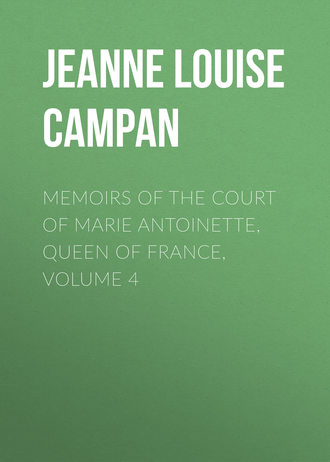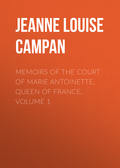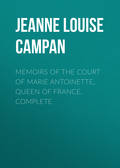
Jeanne Louise Henriette Campan
Memoirs of the Court of Marie Antoinette, Queen of France, Volume 4
When Boehmer was gone, I wanted to follow him, and go to the Queen; my father-in-law prevented me, and ordered me to leave the minister to elucidate such an important affair, observing that it was an infernal plot; that I had given Boehmer the best advice, and had nothing more to do with the business. Boehmer never said one word to me about the woman De Lamotte, and her name was mentioned for the first time by the Cardinal in his answers to the interrogatories put to him before the King. After seeing the Cardinal, Boehmer went to Trianon, and sent a message to the Queen, purporting that I had advised him to come and speak to her. His very words were repeated to her Majesty, who said, "He is mad; I have nothing to say to him, and will not see him." Two or three days afterwards the Queen sent for me to Petit Trianon, to rehearse with me the part of Rosina, which she was to perform in the "Barbier de Seville." I was alone with her, sitting upon her couch; no mention was made of anything but the part. After we had spent an hour in the rehearsal, her Majesty asked me why I had sent Boehmer to her; saying he had been in my name to speak to her, and that she would not see him. It was in this manner I learnt that he had not followed my advice in the slightest degree. The change of my countenance, when I heard the man's name, was very perceptible; the Queen perceived it, and questioned me. I entreated her to see him, and assured her it was of the utmost importance for her peace of mind; that there was a plot going on, of which she was not aware; and that it was a serious one, since engagements signed by herself were shown about to people who had lent Boehmer money. Her surprise and vexation were great. She desired me to remain at Trianon, and sent off a courier to Paris, ordering Boehmer to come to her upon some pretext which has escaped my recollection. He came next morning; in fact it was the day on which the play was performed, and that was the last amusement the Queen allowed herself at that retreat.
The Queen made him enter her closet, and asked him by what fatality it was that she was still doomed to hear of his foolish pretence of selling her an article which she had steadily refused for several years. He replied that he was compelled, being unable to pacify his creditors any longer. "What are your creditors to me?" said her Majesty. Boehmer then regularly related to her all that he had been made to believe had passed between the Queen and himself through the intervention of the Cardinal. She was equally incensed and surprised at each thing she heard. In vain did she speak; the jeweller, equally importunate and dangerous, repeated incessantly, "Madame, there is no longer time for feigning; condescend to confess that you have my necklace, and let some assistance be given to me, or my bankruptcy will soon bring the whole to light."
It is easy to imagine how the Queen must have suffered. On Boehmer's going away, I found her in an alarming condition; the idea that any one could have believed that such a man as the Cardinal possessed her full confidence; that she should have employed him to deal with a tradesman without the King's knowledge, for a thing which she had refused to accept from the King himself, drove her to desperation. She sent first for the Abbe de Vermond, and then for the Baron de Breteuil. Their hatred and contempt for the Cardinal made them too easily forget that the lowest faults do not prevent the higher orders of the empire from being defended by those to whom they have the honour to belong; that a Rohan, a Prince of the Church, however culpable he might be, would be sure to have a considerable party which would naturally be joined by all the discontented persons of the Court, and all the frondeurs of Paris. They too easily believed that he would be stripped of all the advantages of his rank and order, and given up to the disgrace due to his irregular conduct; they deceived themselves.
I saw the Queen after the departure of the Baron and the Abbe; her agitation made me shudder. "Fraud must be unmasked," said she; "when the Roman purple and the title of Prince cover a mere money-seeker, a cheat who dares to compromise the wife of his sovereign, France and all Europe should know it." It is evident that from that moment the fatal plan was decided on. The Queen perceived my alarm; I did not conceal it from her. I knew too well that she had many enemies not to be apprehensive on seeing her attract the attention of the whole world to an intrigue that they would try to complicate still more. I entreated her to seek the most prudent and moderate advice. She silenced me by desiring me to make myself easy, and to rest satisfied that no imprudence would be committed.
On the following Sunday, the 15th of August, being the Assumption, at twelve o'clock, at the very moment when the Cardinal, dressed in his pontifical garments, was about to proceed to the chapel, he was sent for into the King's closet, where the Queen then was.
The King said to him, "You have purchased diamonds of Boehmer?"
"Yes, Sire."
"What have you done with them?"
"I thought they had been delivered to the Queen."
"Who commissioned you?"
"A lady, called the Comtesse de Lamotte-Valois, who handed me a letter from the Queen; and I thought I was gratifying her Majesty by taking this business on myself."
The Queen here interrupted him and said, "How, monsieur, could you believe that I should select you, to whom I have not spoken for eight years, to negotiate anything for me, and especially through the mediation of a woman whom I do not even know?"
"I see plainly," said the Cardinal, "that I have been duped. I will pay for the necklace; my desire to please your Majesty blinded me; I suspected no trick in the affair, and I am sorry for it."
He then took out of his pocket-book a letter from the Queen to Madame de Lamotte, giving him this commission. The King took it, and, holding it towards the Cardinal, said:
"This is neither written nor signed by the Queen. How could a Prince of the House of Rohan, and a Grand Almoner of France, ever think that the Queen would sign Marie Antoinette de France? Everybody knows that queens sign only by their baptismal names. But, monsieur," pursued the King, handing him a copy of his letter to Baehmer, "have you ever written such a letter as this?"
Having glanced over it, the Cardinal said, "I do not remember having written it."
"But what if the original, signed by yourself, were shown to you?"
"If the letter be signed by myself it is genuine."
He was extremely confused, and repeated several times, "I have been deceived, Sire; I will pay for the necklace. I ask pardon of your Majesties."
"Then explain to me," resumed the King, "the whole of this enigma. I do not wish to find you guilty; I had rather you would justify yourself. Account for all the manoeuvres with Baehmer, these assurances and these letters."
The Cardinal then, turning pale, and leaning against the table, said,
"Sire, I am too much confused to answer your Majesty in a way—"
"Compose yourself, Cardinal, and go into my cabinet; you will there find paper, pens, and ink,—write what you have to say to me."
The Cardinal went into the King's cabinet, and returned a quarter of an hour afterwards with a document as confused as his verbal answers had been. The King then said, "Withdraw, monsieur." The Cardinal left the King's chamber, with the Baron de Breteuil, who gave him in custody to a lieutenant of the Body Guard, with orders to take him to his apartment. M. d'Agoult, aide-major of the Body Guard, afterwards took him into custody, and conducted him to his hotel, and thence to the Bastille. But while the Cardinal had with him only the young lieutenant of the Body Guard, who was much embarrassed at having such an order to execute, his Eminence met his heyduc at the door of the Salon of Hercules; he spoke to him in German and then asked the lieutenant if he could lend him a pencil; the officer gave him that which he carried about him, and the Cardinal wrote to the Abbe Georgel, his grand vicar and friend, instantly to burn all Madame de Lamotte's correspondence, and all his other letters.
[The Abbe Georgel thus relates the circumstance: The Cardinal, at that trying moment, gave an astonishing proof of his presence of mind; notwithstanding the escort which surrounded him, favoured by the attendant crowd, he stopped, and stooping down with his face towards the wall, as if to fasten his buckle, snatched out his pencil and hastily wrote a few words upon a scrap of paper placed under his hand in his square red cap. He rose again and proceeded. on entering his house, his people formed a lane; he slipped this paper, unperceived, into the hand of a confidential valet de chambre, who waited for him at the door of his apartment." This story is scarcely credible; it is not at the moment of a prisoner's arrest, when an inquisitive crowd surrounds and watches him, that he can stop and write secret messages. However, the valet de chambre posts off to Paris. He arrives at the palace of the Cardinal between twelve and one o'clock; and his horse falls dead in the stable. "I was in my apartment," said the Abbe Georgel, "the valet de chambre entered wildly, with a deadly paleness on his countenance, and exclaimed, 'All is lost; the Prince is arrested.' He instantly fell, fainting, and dropped the note of which he was the bearer." The portfolio containing the papers which might compromise the Cardinal was immediately placed beyond the reach of all search. Madame de Lamotte also was foolishly allowed sufficient time after she heard of the arrest of the Cardinal to burn all the letters she had received from him. Assisted by Beugnot, she completed this at three the same morning that she was: arrested at four.—See "Memoirs of Comte de Beugnot," vol i., p. 74.]
This commission was executed before M. de Crosne, lieutenant of police, had received an order from the Baron de Breteuil to put seals upon the Cardinal's papers. The destruction of all his Eminence's correspondence, and particularly that with Madame de Lamotte, threw an impenetrable cloud over the whole affair.
From that moment all proofs of this intrigue disappeared. Madame de Lamotte was apprehended at Bar-sur-Aube; her husband had already gone to England. From the beginning of this fatal affair all the proceedings of the Court appear to have been prompted by imprudence and want of foresight; the obscurity resulting left free scope for the fables of which the voluminous memorials written on one side and the other consisted. The Queen so little imagined what could have given rise to the intrigue, of which she was about to become the victim, that, at the moment when the King was interrogating the Cardinal, a terrific idea entered her mind. With that rapidity of thought caused by personal interest and extreme agitation, she fancied that, if a design to ruin her in the eyes of the King and the French people were the concealed motive of this intrigue, the Cardinal would, perhaps, affirm that she had the necklace; that he had been honoured with her confidence for this purchase, made without the King's knowledge; and point out some secret place in her apartment, where he might have got some villain to hide it. Want of money and the meanest swindling were the sole motives for this criminal affair. The necklace had already been taken to pieces and sold, partly in London, partly in Holland, and the rest in Paris.
The moment the Cardinal's arrest was known a universal clamour arose. Every memorial that appeared during the trial increased the outcry. On this occasion the clergy took that course which a little wisdom and the least knowledge of the spirit of such a body ought to have foreseen. The Rohans and the House of Conde, as well as the clergy, made their complaints heard everywhere. The King consented to having a legal judgment, and early in September he addressed letters-patent to the Parliament, in which he said that he was "filled with the most just indignation on seeing the means which, by the confession of his Eminence the Cardinal, had been employed in order to inculpate his most dear spouse and companion."
Fatal moment! in which the Queen found herself, in consequence of this highly impolitic step, on trial with a subject, who ought to have been dealt with by the power of the King alone. The Princes and Princesses of the House of Conde, and of the Houses of Rohan, Soubise, and Guemenee, put on mourning, and were seen ranged in the way of the members of the Grand Chamber to salute them as they proceeded to the palace, on the days of the Cardinal's trial; and Princes of the blood openly canvassed against the Queen of France.
The Pope wished to claim, on behalf of the Cardinal de Rohan, the right belonging to his ecclesiastical rank, and demanded that he should be judged at Rome. The Cardinal de Bernis, ambassador from France to his Holiness, formerly Minister for Foreign Affairs, blending the wisdom of an old diplomatist with the principles of a Prince of the Church, wished that this scandalous affair should be hushed up. The King's aunts, who were on very intimate terms with the ambassador, adopted his opinion, and the conduct of the King and Queen was equally and loudly censured in the apartments of Versailles and in the hotels and coffee-houses of Paris.
Madame, the King's sister-in-law, had been the sole protectress of De Lamotte, and had confined her patronage to granting her a pension of twelve to fifteen hundred francs. Her brother was in the navy, but the Marquis de Chabert, to whom he had been recommended, could never train a good officer. The Queen in vain endeavoured to call to mind the features of this person, of whom she had often heard as an intriguing woman, who came frequently on Sundays to the gallery of Versailles. At the time when all France was engrossed by the persecution against the Cardinal, the portrait of the Comtesse de Lamotte Valois was publicly sold. Her Majesty desired me one day, when I was going to Paris, to buy her the engraving, which was said to be a tolerable likeness, that she might ascertain whether she could recognise in it any person whom she might have seen in the gallery.
[The public, with the exception of the lowest class, were admitted into the gallery and larger apartments of Versailles, as they were into the park.—MADAME CAMPAN.]
The woman De Lamotte's father was a peasant at Auteuil, though he called himself Valois. Madame de Boulainvilliers once saw from her terrace two pretty little peasant girls, each labouring under a heavy bundle of sticks. The priest of the village, who was walking with her, told her that the children possessed some curious papers, and that he had no doubt they were descendants of a Valois, an illegitimate son of one of the princes of that name.
The family of Valois had long ceased to appear in the world. Hereditary vices had gradually plunged them into the deepest misery. I have heard that the last Valois then known occupied the estate called Gros Bois; that as he seldom came to Court, Louis XIII. asked him what he was about that he remained so constantly in the country; and that this M. de Valois merely answered, "Sire, I only do there what I ought." It was shortly afterwards discovered that he was coining.
Neither the Queen herself nor any one near her ever had the slightest connection with the woman De Lamotte; and during her prosecution she could point out but one of the Queen's servants, named Desclos, a valet of the Queen's bedchamber, to whom she pre tended she had delivered Boehmer's necklace. This Desclos was a very honest man; upon being confronted with the woman De Lamotte, it was proved that she had never seen him but once, which was at the house of the wife of a surgeon-accoucheur at Versailles, the only person she visited at Court; and that she had not given him the necklace. Madame de Lamotte married a private in Monsieur's body-guard; she lodged at Versailles at the Belle Image, a very inferior furnished house; and it is inconceivable how so obscure a person could succeed in making herself believed to be a friend of the Queen, who, though so extremely affable, seldom granted audiences, and only to titled persons.
The trial of the Cardinal is too generally known to require me to repeat its details here. The point most embarrassing to him was the interview he had in February, 1785, with M. de Saint-James, to whom he confided the particulars of the Queen's pretended commission, and showed the contract approved and signed Marie Antoinette de France. The memorandum found in a drawer of the Cardinal's bureau, in which he had himself written what Baehmer told him after having seen me at my country house, was likewise an unfortunate document for his Eminence.
I offered to the King to go and declare that Baehmer had told me that the Cardinal assured him he had received from the Queen's own hand the thirty thousand francs given on account upon the bargain being concluded, and that his Eminence had seen her Majesty take that sum in bills from the porcelain secretaire in her boudoir. The King declined my offer, and said to me, "Were you alone when Boehmer told you this?" I answered that I was alone with him in my garden. "Well," resumed he, "the man would deny the fact; he is now sure of being paid his sixteen hundred thousand francs, which the Cardinal's family will find it necessary to make good to him; we can no longer rely upon his sincerity; it would look as if you were sent by the Queen, and that would not be proper."
[The guilty woman no sooner knew that all was about to be discovered than she sent for the jewellers, and told them the Cardinal had perceived that the agreement, which he believed to have been signed by the Queen, was a false and forged document. "However," added she, "the Cardinal possesses a considerable fortune, and he can very well pay you." These words reveal the whole secret. The Countess had taken the necklace to herself, and flattered herself that M. de Rohan, seeing himself deceived and cruelly imposed upon, would determine to pay and make the beat terms he could, rather than suffer a matter of this nature to become public.-"Secret Correspondence of the Court of Louis XVI."]
The procureur general's information was severe on the Cardinal. The Houses of Conde and Rohan and the majority of the nobility saw in this affair only an attack on the Prince's rank, the clergy only a blow aimed at the privileges of a cardinal. The clergy demanded that the unfortunate business of the Prince Cardinal de Rohan should be submitted to ecclesiastical jurisdiction, and the Archbishop of Narbonne, then President of the Convocation, made representations upon the subject to the King; the bishops wrote to his Majesty to remind him that a private ecclesiastic implicated in the affair then pending would have a right to claim his constitutional judges, and that this right was refused to a cardinal, his superior in the hierarchical order. In short, the clergy and the greater part of the nobility were at that time outrageous against authority, and chiefly against the Queen.
The procureur-general's conclusions, and those of a part of the heads of the magistracy, were as severe towards the Cardinal as the information had been; yet he was fully acquitted by a majority of three voices; the woman De Lamotte was condemned to be whipped, branded, and imprisoned; and her husband, for contumacy, was condemned to the galleys for life.
[The following extract is from the "Memoirs" of the Abbe Georgel: "The sittings were long and multiplied; it was necessary to read the whole proceedings; more than fifty judges sat; a master of requests; a friend of the Prince, wrote down all that was said there, and sent it to his advisers, who found means to inform the Cardinal of it, and to add the plan of conduct he ought to pursue." D'Epremesnil, and other young counsellors, showed upon that occasion but too much audacity in braving the Court, too much eagerness in seizing an opportunity of attacking it. They were the first to shake that authority which their functions made it a duty in them to respect.—NOTE BY THE EDITOR.]
M. Pierre de Laurencel, the procureur general's substitute, sent the Queen a list of the names of the members of the Grand Chamber, with the means made use of by the friends of the Cardinal to gain their votes during the trial. I had this list to keep among the papers which the Queen deposited in the house of M. Campan, my father-in-law, and which, at his death, she ordered me to preserve. I burnt this statement, but I remember ladies performed a part not very creditable to their principles; it was by them, in consideration of large sums which they received, that some of the oldest and most respected members were won over. I did not see a single name amongst the whole Parliament that was gained directly.
The belief confirmed by time is, that the Cardinal was completely duped by the woman De Lamotte and Cagliostro. The King may have been in error in thinking him an accomplice in this miserable and criminal scheme, but I have faithfully repeated his Majesty's judgment about it.
However, the generally received opinion that the Baron de Breteuil's hatred for the Cardinal was the cause of the scandal and the unfortunate result of this affair contributed to the disgrace of the former still more than his refusal to give his granddaughter in marriage to the son of the Duc de Polignac. The Abbe de Vermond threw the whole blame of the imprudence and impolicy of the affair of the Cardinal de Rohan upon the minister, and ceased to be the friend and supporter of the Baron de Breteuil with the Queen.





